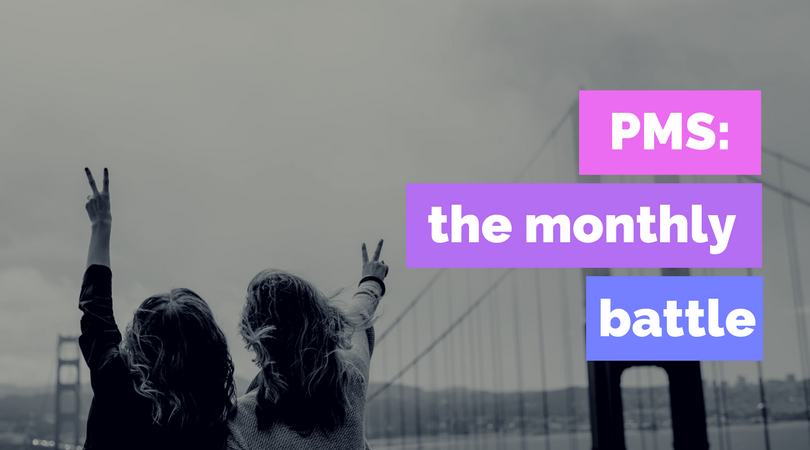
PMS:The Monthly Battle

PMS or pre-menstrual syndrome is a term we have all heard since puberty but do you really know how deep the effects can go? Most people joke about PMS making someone cranky just before their period and to be completely honest this is all I ever thought it meant too. How wrong I was…
As a teenager, I always suffered from greasy hair and skin and this was made worse during my time of the month but I kinda just assumed it was part and parcel of being a teen. Yeah, I got a bit more stressy but that is something that I think most of us feel around this time due to the increase in hormones. I was never bothered by my period though. When it first started it was heavy but as I got older this sorted itself out. I have always been regular and have never had to rely on the pill or other hormones to help with pain, flow or regularities. And then I had a baby…
First PMS Problems
I breastfed Jake for 9 months so all in all, I was period free for around 18 months – bliss. Some of the benefits of breastfeeding that I saw were a fab complexion, thick, shiny hair and a happy mood. It was a very content time.
Once my milk had dried up my period returned pretty much immediately. The first noticeable change was the fact that my flow had returned to being heavy and painful just as it had done when it first arrived during puberty. I then noticed my spots were returning along with greasy skin and hair (hair loss comes with the end of breastfeeding too plus, for me, greys!) During breastfeeding I had the best skin tone I’d had since being a kid and after having Jake I just assumed it was going to remain clear; wishful thinking. With the return of my period, it was like the return of being a teenager. I felt greasy, dirty, bloated, tired, worn out, yucky and my boobs killed!!
Noticing More Problems
Over the last year or so I have noticed that each month has gradually become worse. My migraines returned with a vengeance. I had a 3 day, bedridden, intensive migraine that terrified me so much that I thought there may have been something else wrong. The doctor had to prescribe a drug to help as the over the counter brand which I usually use just couldn’t touch the pain. I have never been a very teary person and it always used to take a lot to make me cry, now all it takes is some soppy music at the end of a film where ‘they’ finally get together or when Nemo finally finds his dad and that’s it, a blubbering mess! My stress levels have also increased which have led to me becoming angry and at times I haven’t felt as though I can control the feeling. Exhaustion hasn’t helped towards the matter and can also make me feel drained and low around this time. Each symptom triggers off another and anxiety and depression can often result from the tiredness and anger. The only way I can describe it is that it’s like having a big black cloud hanging over your brain for maybe a week or two each month. Some days it shifts a little and it’s not quite so cloudy and once the period starts it completely vanishes and I just feel ‘normal’ again. Add in the usual symptoms you can normally associate with your time of the month and you literally have a woman who feels like she is slowly going mad for several weeks every single month.
I visited a doctor because I really thought there was a serious issue with me mentally or emotionally. As I named my symptoms he ticked them off his list (almost in order!) and diagnosed me with PMS. I gave a little giggle and asked if he was sure, thinking that was just a little stressy time you got before your period hit. He printed off the information he had so I could go through it all there with him and make some decisions on my options. I was very surprised to be told all the symptoms and effects this condition has.
Here is what the NHS states about PMS:
“Nearly all women of childbearing age have some premenstrual symptoms, but women in their late 20s to their early 40s are most likely to experience PMS.
Around 1 in every 20 women have symptoms that are severe enough to stop them living their normal lives. This is often the result of a more intense type of PMS known as premenstrual dysphoric disorder (PMDD).
Common symptoms of PMS
More than 100 different symptoms of PMS have been recorded. Some of the most common are listed below.
Physical symptoms
- feeling bloated
- pain and discomfort in your abdomen (tummy)
- headaches
- backache
- muscle and joint pain
- breast pain
- trouble sleeping/insomnia
- nausea
- weight gain (up to 1kg)
Any long-term (chronic) illnesses, such as asthma or migraines, may get worse.
Psychological and behavioural symptoms
- mood swings
- feeling upset or emotional
- feeling irritable or angry
- crying
- anxiety
- difficulty concentrating
- confusion and forgetfulness
- clumsiness
- restlessness
- tiredness
- decreased self-esteem
- loss of libido – loss of interest in sex
- appetite changes or food cravings
Premenstrual dysphoric disorder (PMDD)
While most people with PMS find their symptoms uncomfortable, a small percentage have symptoms severe enough to stop them living their normal lives.
This is the result of a more intense type of PMS known as premenstrual dysphoric disorder (PMDD).
The symptoms of PMDD are similar to those of PMS, but are more exaggerated and often have more psychological symptoms than physical ones.
Symptoms can include:
- feelings of hopelessness
- persistent sadness or depression
- extreme anger and anxiety
- decreased interest in usual activities
- sleeping much more or less than usual
- very low self-esteem
- extreme tension and irritability
As depression is a common symptom of PMDD, it’s possible that a person with PMDD may have thoughts about suicide. PMDD can be particularly difficult to deal with as it can have a negative effect on your daily life and relationships.”
What To Do
The doctor said that options for controlling PMS problems included the pill but I cannot take any of these types of drugs due to my Mum’s breast cancer and my migraines – I simply refuse to take the risk. Anti-depressants are also an option but having taken these in the past (due to my Mum’s death) I didn’t feel I wanted to go down that path again. He advised that exercise can help with moods, magnesium can aid with tiredness, to look into vitamins D, B and Calcium and to gain support from family members. He said that it was best for me to go away and research all the remedies myself and to come back to discuss if needed.
I am already a very active person who goes running and takes part in exercise classes so I knew I could use this to help and focus myself and my mindset. I spoke to family and friends to let them know how my hormones were making me feel each month and all were very open and supportive. I started to take magnesium and I was seeing a change in my tiredness but with being busy and running around with a toddler I have found that I have yet again put my needs last (which is daft, because a happy Mum means a happy boy) and I keep forgetting to take them – I know I need to tackle this (NOTE: Magnesium is also found in green veg).
I have done further research and have heard that evening primrose oil tablets can also help with relaxation as can herbal remedies such as Kalm’s tablets and Bach Rescue Remedy. I read that carbohydrates can affect PMS due to them causing a rapid increase in glucose which can bring on mood swings and weight gain. I have cut out white bread, been trying out spinach pasta instead of the usual white variety and have tried my best to convert to sweet potatoes, but there is only so much I can handle. Fish oils can also help with the mood swings and pain but I don’t eat fish so my next step will be to try supplements.
I have seen other remedies online but I suppose it is just a case of trial and error to see what will actually work for you. I have held off diving straight into trying everything out there as I am slowly trying to work out which methods can work and which need writing off altogether. I do believe that relaxation, plenty of sleep, plenty of water and exercise can help immensely… shame that my sleep has been interrupted so much in the last 2 years, which may be a major contributing factor. Last month I contacted a reflexologist to see if she could help with my issues. She was fantastic at discussing all that she was doing, working on every area across my body (via my pressure points in my feet of course) and creating a calming atmosphere. She did find some ‘crunching’ around my ovaries so she focused on these for a little longer to try and help with my future cycles. Afterwards, I felt amazing! I was so chilled, was sky high and felt like I could have slept for the rest of the day. It definitely helped with relaxation and just by getting out and having a little ‘me time’ (yep, I go on about this a lot in my blogs) it all just added to what was really needed. I am booked in again next month so only time will tell if it has a positive effect on my PMS. I can honestly say that I have had no migraines so far this month and I do believe that I have been calmer overall. Unfortunately most of this week I have still felt that big black cloud hanging over my brain. Yesterday that cloud was gone. I felt brighter, happier, cheery and my mind felt clear; it was a truly brilliant moment and I know full well that I will forget about that dark time until it rears its ugly head again next month (the period fairy visited today and I always know it will the day after I feel amazing. I am beginning to tune into my symptoms). Each month I am going to keep trying to be aware of the effects, I am going to look for any triggers and for the sake of everyone around me I am going to work out what is best for my symptoms and my body.
During my research, I stumbled across the website National Association for PMS. They offer help, advice and support to anyone who needs it. If you are also suffering please check out this site and do visit your doctor if you have read any of this and feel I may have touched on something you are also feeling. We shouldn’t be shying away from PMS and it is no joking matter. It can lead to some more serious mental issues and talking openly about how we all feel is the first step to raising awareness for everybody.

Pin for later:





